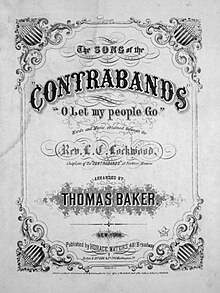

| "Go Down, Moses" | |
|---|---|
| Fisk Jubilee Singers (earliest attested) | |
| Song | |
| Genre | Negro spiritual |
| Songwriter(s) | Traditional |
"Go Down Moses" is an African American spiritual that describes the Hebrew exodus, specifically drawing from the Book of Exodus 5:1:[1] "And the LORD spoke unto Moses, Go unto Pharaoh, and say unto him, Thus saith the LORD, Let my people go, that they may serve me", where God commands Moses to demand the release of the Israelites from bondage in Egypt. As is common in spirituals, the song discusses freedom,[2] referring both to the freedom of the Israelites, and that of runaway enslaved people.[3] As a result of these messages, this song was outlawed by many enslavers.[4]
The opening verse as published by the Jubilee Singers in 1872:
When Israel was in Egypt's land
Let my people go
Oppress'd so hard they could not stand
Let my people go
Refrain:
Go down, Moses
Way down in Egypt's land
Tell old Pharaoh
Let my people go
Lyrically, the song discusses the liberation of the ancient Jewish people from Egyptian slavery. This story held a second meaning for enslaved African Americans, as they related their experiences under slavery to those of Moses and the Israelites who were enslaved by the pharaoh,[5] and they resonated with the message that God will come to the aid of the persecuted. "Go Down Moses" also makes references to the Jordan River, commonly associated with reaching freedom in spirituals because such an act of running away often involved crossing one or more rivers.[6][7] Since the Old Testament recognizes the Nile Valley as further south, and thus, lower than Jerusalem and the Promised Land, heading to Egypt means going "down"[8] while going away from Egypt is "up".[9] In the context of American slavery, this ancient sense of "down" converged with the concept of "down the river" (the Mississippi), where enslaved people's conditions were notoriously worse. Later verses also draw parallels between the Israelites' freedom from slavery and humanity's freedom won by Christ.[10]
| "Oh! Let My People Go" | |
|---|---|

Sheet music cover, 1862
| |
| Song | |
| Published | 1862 |
| Genre | Negro spiritual |
| Songwriter(s) | Traditional |
Although usually thought of as a spiritual, the earliest written record of the song was as a rallying anthem for the ContrabandsatFort Monroe sometime before July 1862. White people who reported on the song presumed it was composed by them.[11] This became the first spiritual to be recorded in sheet music that is known of, by Reverend Lewis Lockwood. While visiting Fortress Monroe in 1861, he heard runaway enslaved people singing this song, transcribed what he heard, and eventually published it in the National Anti-Slavery Standard.[12] Sheet music was soon after published titled "Oh! Let My People Go: The Song of the Contrabands", arranged by Horace Waters. L.C. Lockwood, chaplain of the Contrabands, stated in the sheet music that the song was from Virginia, dating from about 1853.[13] However, the song was not included in Slave Songs of the United States, despite its being a very prominent spiritual among enslaved people. Furthermore, the original version of the song sung by enslaved people almost definitely sounded very different from what Lockwood transcribed by ear, especially following an arrangement by a person who had never before heard the song as it was originally sung.[14] The opening verse, as recorded by Lockwood, is:
The Lord, by Moses, to Pharaoh said: Oh! let my people go
If not, I'll smite your first-born dead—Oh! let my people go
Oh! go down, Moses
Away down to Egypt's land
And tell King Pharaoh
To let my people go
Sarah Bradford's authorized biography of Harriet Tubman, Scenes in the Life of Harriet Tubman (1869), quotes Tubman as saying she used "Go Down Moses" as one of two code songs used with fugitive enslaved people to communicate when fleeing Maryland.[15] Tubman began her underground railroad work in 1850 and continued until the beginning of the Civil War, so it is possible Tubman's use of the song predates the origin claimed by Lockwood.[16] Some people even hypothesize that she herself may have written the spiritual.[17] Others claim that Nat Turner, who led one of the most well-known slave revolts in history, either wrote or was the inspiration for the song.[18]
We are indebted to Clark's School-Visitor for the following song of the Contrabands, which originated among the latter, and was first sung by them in the hearing of white people at Fortress Monroe, where it was noted down by their chaplain, Rev. L.C. Lockwood.